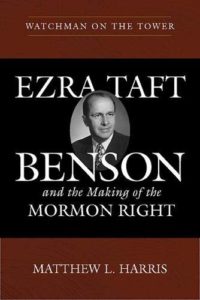 Title: Watchman on the Tower: Ezra Taft Benson and the Making of the Mormon Right
Title: Watchman on the Tower: Ezra Taft Benson and the Making of the Mormon Right
Author: Matthew Harris
Publisher: University of Utah Press
Genre: History, biography
Year: 2020
Number of Pages: 288
Reviewed by Curtis Cahoon
Oh my, I knew this book was going to be difficult and fascinating at the same time. As an active, believing member of the Church of Jesus Christ of Latter-day Saints who at the same time struggles with the sometimes fundamentalist right wing worldview that some of my fellow church members hold, this book was bound to challenge me. It is simultaneously fascinating and disheartening to read of how the political views and activities of President Ezra Taft Benson played a large part in shaping the worldview that, in my opinion is doing great harm to the political climate in my home country that I love so much. I will summarize the things from the book that really stood out to me in the following paragraphs.
As a quick summary, the book is well-written, fascinating (if a little short), and a little unsettling at times. It helped so much that I observed in the church while growing up in the 1980’s and early 1990’s make so much more sense, such as annual reminders of political neutrality of the church, not using church buildings for political campaigns or recruiting, regular discussions of “the constitution hanging by a thread,” etc. On the positive side, it made my already high level of respect for President Gordon B. Hinckley grow even more, to see the ways in which he used his influence to counter some of Benson’s extreme views with respect to church governance and influence. I also was reminded of how my life has been enriched by the emphasis that President Benson placed on regular, deep study of the Book of Mormon, as well as his warnings on the danger of pride in our lives.
First, a little on where I’m coming from. Politically I fall a little to the right of center, and consider myself to be politically conservative. I’ve lived over 30 years in Idaho, the conservative state where President Benson was born and lived for most of his life prior to being called as an apostle. In fact, my paternal grandmother grew up on a neighboring farm to the Benson farm in the Whitney-Preston Idaho area. She was only a few years old when President Benson left home to attend Utah State Agricultural College, but knew his family fairly well. At the same time, my maternal grandfather, a staunch Catholic democrat from northern Idaho, worked as a soil scientist for the federal government, starting his career around the time FDR was elected and New Deal policies were implemented. I remember being puzzled by my grandpa telling my mother that he couldn’t understand how the LDS church could allow a politician like him to be the leader of the church, and how he absolutely did not like President Benson. After my years of learning, and reading this and a couple other books on Benson’s political career, I completely understand why he felt this way.
The book does an outstanding job giving the details of Benson’s early professional career, how he was drawn into the politics of agriculture, how he developed such a critical stance on New Deal programs, and how Benson’s experience in post-WWII Europe, followed by political service in Washington DC shaped his political views. The author does an awesome job on this part, using some previously unavailable sources to fill in details I had not known previously (including Ezra Taft Benson’s FBI files). I was already aware of the contention caused by Benson’s mixing of politics and religion among the apostles and first presidency. These basic dynamics and details are already covered well in Greg Prince’s excellent biography of David O. McKay.
One thing I did appreciate was how Matthew Harris examined in some detail how some right wing movements popular among some Latter-Day Saints today were directly influenced by the outspoken President Benson (Preppers, Bundy family, etc). At the same time, I was grateful to see how many other general authorities pushed back against President Benson, Cleon Skousen, and the influence they tried to exude over the church. I also developed greater empathy for President Benson, why he somewhat justifiably held some of his views, and gained a greater appreciation for his love of country and personal liberty, despite my strong disagreement with many of his extreme political views. While this book may not be for everyone, I would recommend it to many of my friends.
